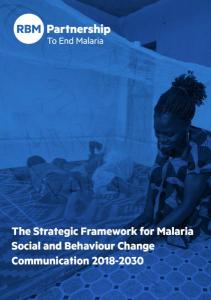The Strategic Framework for Malaria Social and Behaviour Change Communication 2018-2030
In 2012, the Strategic Framework for Malaria SBCC: 2012-2017 set forth an agenda to advocate for and strengthen technical capacity for SBCC; a number of developments have occurred since its publication to warrant an update and extension of the original framework.
Available in English, French, and Portuguese.
Many people in malaria-prone areas now have access to insecticide-treated nets (ITNs) and to effective antimalarial drug treatment. Although the number of countries with areas of low transmission has grown, the number of new pharmacological, epidemiological and vector challenges has also increased. Recent global strategy documents, such as the RBM Partnership’s Action and Investment to Defeat Malaria and WHO’s Global Technical Strategy for Malaria, call for new approaches and interventions as countries scale up and the dynamics of malaria transmission change.
The intended audiences for the Strategic Framework are:
- Technical staff at the global, national, and local levels who are responsible for designing, implementing, monitoring, evaluating, and coordinating malaria control and elimination policies, strategies, and interventions
- RBM SBCC-oriented partners who are engaged in developing, implementing, and evaluating SBCC programmes/projects and who contribute to the global discourse on effective approaches to SBCC
The document is divided into three major parts that address specific themes:
- Advocacy: Champion the critical role of malaria SBCC, Share the malaria SBCC evidence base, Ensure political commitment for SBCC Improve capacity and coordination, Provide support at global and regional levels, Grow the RBM SBCC Working Group, Adapt to new SBCC challenges
- Technical Guidance: Characteristics of effective SBCC planning, Overview of process, Elements of a malaria SBCC strategy, Global Changes
- Toolkits and Resources: Malaria SBCC resources
Last modified: March 25, 2019
Language: English, French, Portuguese

